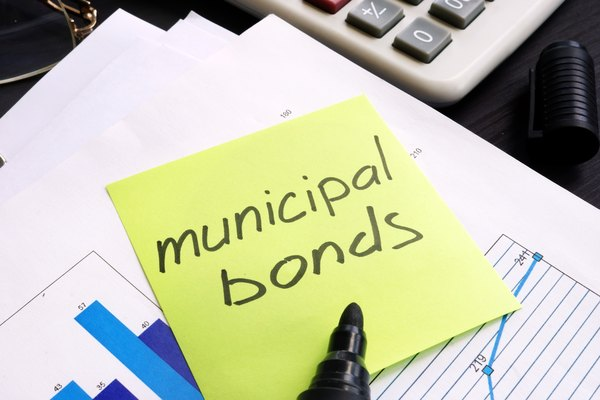Municipal Bonds vs. Taxable Bonds and CDs: How Do They Compare?
May 26, 2025 By Rick Novak
Unlike municipal bonds, the federal government does not tax people with high tax rates. Calculating the tax-equivalent return of a municipal bond is necessary in order to make a fair comparison to taxable bonds. Even though certificates of deposit have less risk than other investments, municipal bonds have done better in the past.
This article will cover Municipal Bonds, Taxable Bonds, and Corporate Bonds. Keep reading to know more.
Municipal Bonds

A municipal bond is tax-exempt by state and local governments to fund public projects.
Local governments sell municipal bonds to finance infrastructure improvements. This includes new roads, hospitals, and schools. The municipal bond market offers two distinct types:
- General obligation: The funding for projects that do not provide revenue. This includes parks and playgrounds and comes from the sale of general obligation bonds. They are backed by the complete confidence and resources of the municipality that issued them.
- Revenue: Revenue bond is secured by the predetermined amount of income they are expected to produce.
The benefit of Municipal Bonds: They provide security for your investment portfolio and have low default rates. Municipal bonds are attractive investments. The interest earned is not subject to federal income tax.
Taxable Bonds
Governments and corporations issue taxable bonds. They are subject to federal and state income taxes but offer higher yields than tax-exempt bonds.
Bonds that are subject to federal income tax are called taxable bonds. One of the benefits is that they are easily accessible. They come in various maturities, formats, corporate bonds, and Treasury and high-yield bonds. Another advantage is that they are widely available. Taxable bonds might be a better option if an investor is looking for a larger yield. But they also must be mindful of the potential tax ramifications.
The Benefit of Taxable Bonds: Taxable bonds can provide higher yields than tax-exempt bonds. It can attract investors seeking more significant returns. Investors have greater flexibility with taxable bonds regarding the types of securities that can be invested in. Taxable bonds can diversify a portfolio. This allows investors to balance their risk and exposure to different markets.
Corporate Bonds
Companies issue corporate bonds. They are issued to fund business operations and expansion. They generally offer higher yields compared to government bonds.
When issuing bonds, a corporation guarantees its investors interest payments at regular intervals—also, the return of their initial capital on the maturity date. If you buy bonds and keep on to them, you'll earn interest payments for as long as you own them. But, taxes must be paid on the interest income.
The Benefit of Corporate Bonds: Corporate bonds offer greater flexibility than stocks and can be used to diversify a portfolio of investments. Corporate bonds are generally less volatile than stocks, making them a more stable investment option.
Municipal Bonds vs. Taxable Bonds

Municipal bonds are a way for state and local governments to get money to pay for public works projects. Most people agree these investments have low risk because the issuer will stand behind them with full faith and credit. Investors interested in purchasing municipal bonds should consider the rate of return, the risk considerations, and their tax bracket before making any purchases.
Taxable bonds are bonds that have to pay federal income tax. Taxable bonds can be made by corporations or government agencies because there is a chance that taxes will go up. The yields on these bonds are usually higher than those on municipal bonds. Taxable bonds have several benefits, one of which is that they are easy to get and come with various terms and structures.
When deciding between municipal and taxable bonds, investors should consider their goals, how comfortable they are with risk, and their tax situation.
Municipal Bonds vs. Corporate Bonds
A firm issues a corporate bond to obtain cash, while a municipality issues a municipal bond to raise money for public initiatives. Although municipal bond interest is eligible for various tax exemptions, the interest on corporate bonds is always subject to taxation. On the other hand, the yields that are offered by corporate bonds are often higher. When considering either relationship, one should also consider why it was established. Corporations issue bonds to increase profits, while municipal bonds are issued to improve public infrastructure. Investing in municipal bonds is typically considered to be a low-risk activity.
Purchase suggestion: Municipal Bonds vs. Corporate Bonds
Purchasing municipal bonds is one option to consider if you want to impact the neighborhood in which you live positively.
Comparison of Municipal and Taxable Bonds: How to do it
You need to consider the specific investing opportunities available to you carefully. It is necessary for you to calculate the return that is tax comparable on the municipal bond. This will allow you to evaluate the local bond's yield in relation to that of a similar taxable bond.
People also refer to the tax-equivalent yield as the "after-tax" yield. This is the criterion used to determine whether a municipal bond transaction is comparable to another type of investment. This is done to contrast the two different kinds of bond transactions.
To Wrap Up
Investors consider municipal bonds safer than corporate bonds. Regarding risk and return, tax-exempt bonds are somewhere in the middle.
It is important to consider your financial circumstances when deciding whether or not to purchase tax-free municipal bonds. Also, it depends on your financial goals and where you live. The tax equivalent yield of the municipal bond will help you compare the two. Municipal bonds have done better than CDs in the past, even though municipal bonds are less risky. That’s all about Municipal Bonds vs. Corporate Bonds and Municipal Bonds vs. Taxable Bonds.
The choice should be based on the individual investor's wants and long-term goals. When choosing, it's essential to consider each option's pros and cons.

All About Patent Holders

10 Most Prestigious Law Firms in the World

Difference between 457 Plan and 403(b) Plan

What is Student Loan Bankruptcy

What Is the Maximum Conforming Loan Amount?

How the Internet Changed Investing?

What Is The Premium Tax Credit, Form 8962 Of The Internal Revenue Service?

Settling-In Allowance: What is it?

What is a Car Depreciation

Where In The United States Is Best To Purchase A Winter Home?

Ways to Make Walmart Credit Card Payment
